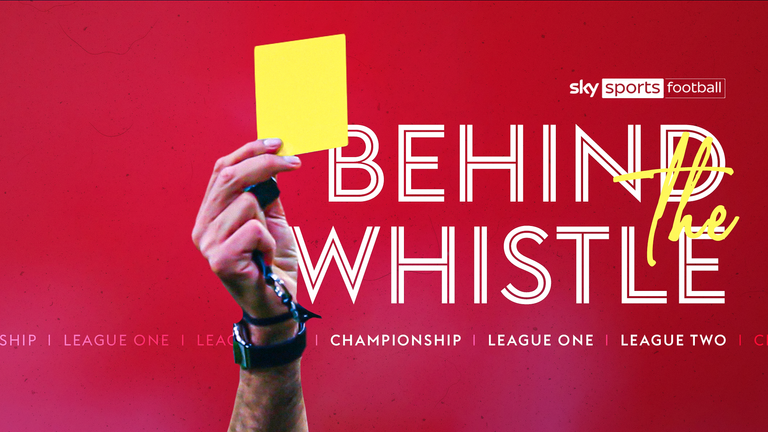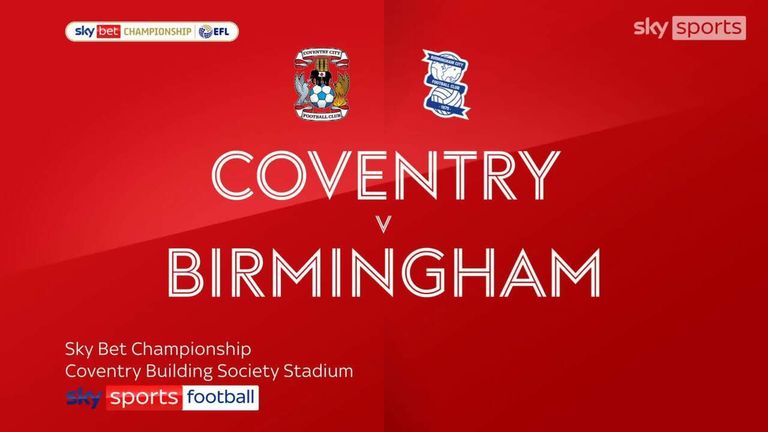Behind the Whistle: Chris Foy explains the latest EFL decisions including Sunderland and Birmingham
Former Premier League referee Chris Foy examines decisions from the latest Sky Bet Championship, League One and League Two action; Coventry City 2-0 Birmingham City, Sunderland 2-1 West Bromwich Albion, Wigan Athletic 0-0 Lincoln City and Colchester United 1-2 Crawley Town all analysed
Tuesday 12 December 2023 16:20, UK
In Behind the Whistle, former Premier League and EFL referee Chris Foy goes through a selection of key match decisions from the latest Sky Bet Championship, League One and League Two action.
Behind the Whistle aims to give supporters of EFL clubs an insight into the decision-making considerations and also clarification of certain calls to provide an understanding of how the laws of the game are interpreted.
As part of a regular feature on Sky Sports following the conclusion of a matchday, Foy will be here to run you through some refereeing matters in the EFL…
- Get Sky Sports | Download the Sky Sports app
- Live football on Sky Sports
- Stream the EFL and more with NOW
Sky Bet Championship
Coventry City 2-0 Birmingham City
Incident: Potential red card - DOGSO (Birmingham City)
Decision: Yellow card awarded stopping a promising attack (Birmingham City)
For this incident, once it has been judged to have been a foul, the referee must determine if it meets the requirements for the denial of an obvious goalscoring opportunity (DOGSO).
For a player to be penalised for DOGSO, four criteria must be met, namely that play is moving towards goal, the foul is not far from goal, the attacker has control of the ball or is likely to gain control, and no players on the defending team can intercept the play.
Two are missing here. Given that the attacking player isn't in control of the ball and the onrushing goalkeeper is on hand to potentially intercept, this fell short of DOGSO and therefore the correct call was to award a free-kick and issue a yellow card for stopping a promising attack, rather than a red card for DOGSO.
Sunderland 2-1 West Bromwich Albion
Incident: Goal scored - potential offside (Sunderland)
Decision: Goal disallowed - offside (Sunderland)
I certainly know the high standard the officials operate at and hold themselves to, and looking back at this particular incident the assistant referee will be disappointed to have misread the situation and called it incorrectly.
The goal scorer for Sunderland is not in an offside position at the moment the initial shot comes in, as he is not closer to the opponent's goal line than the second-last defender, so the correct outcome would have been to award the goal on this occasion.
Sky Bet League One
Wigan Athletic 0-0 Lincoln City
Incident: Potential goal scored (Wigan Athletic)
Decision: Goal disallowed - foul on the goalkeeper (Wigan Athletic)
The goalkeeper makes an unsuccessful attempt to gather the ball at the first attempt, and moves forwards after the ball, coming into contact with the Wigan Athletic attacking player. This requires the referee to determine whether or not the goalkeeper is impeded, which is certainly a subjective call.
My view is that there is simply not enough contact from the attacker to warrant a free-kick being awarded to the goalkeeper and, therefore, I think that the better outcome would have been to give the goal.
Sky Bet League Two
Colchester United 1-2 Crawley Town
Incident: Potential goal scored/penalty (Crawley Town)
Decision: Goal disallowed (offside) - penalty awarded (Crawley Town)
This is a really good bit of officiating by both the referee and his assistant in ruling a goal out for offside, but correctly awarding a penalty to the away side.
The touch of the ball from Crawley's No 25 does indeed find a team-mate (No 9) who is in an offside position, who then proceeds to put the ball beyond the Colchester United goalkeeper. However, the referee identifies that a foul was committed by Colchester's No 16, before the ball was played through, and therefore this is the first offence, and a penalty is awarded.
The penalty judgement is a subjective one, but I think it's okay as the defender makes contact on the attacker and not the ball. A very good decision-making process all-round with the officials coming to the correct outcome.











